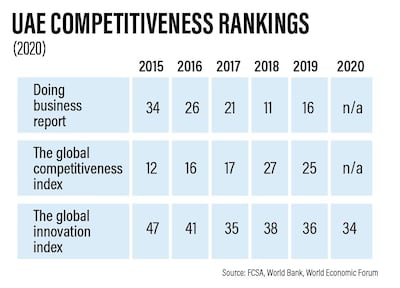Since its independence in 1971, the UAE has risen from being an economy dependent on pearl diving and fishing to a dynamic economic power and a major linchpin on the world energy market.
The country's forward-thinking investment in infrastructure, which helped anchor it as a global trading and transportation hub, its continued economic diversification and harnessing of technology have placed it on a strong footing to evolve further over the next 50 years.
Though the UAE is the world's seventh-largest crude producer, Opec's third-biggest member, and accounts for 5.6 per cent of the world's proven oil reserves, the country's multipronged futuristic approach is paying off.
The World Intellectual Property Organisation's Global Innovation Index ranks the UAE 34th globally compared with 47th in 2015. The country has maintained its spot as the most competitive economy in the Middle East and North Africa in the World Economic Forum's Global Competitiveness Index, which also ranks it 25th globally. The World Bank's ease of Doing Business Report considers the UAE as the 16th easiest place to set up a venture, a big improvement from 2015 when it was ranked 34th.
“The UAE could not have achieved its economic success without oil to fund the accelerated development but it needed visionary leaders to realise the oil bonanza,” Scott Livermore, chief economist and managing director at Oxford Economics, said.
The country's gross domestic product has grown from a base of just Dh11 billion in 1973 to about Dh1.5 trillion in 2019. While the UAE's hydrocarbon-fuelled growth is impressive by any standard, a three-year slump in oil prices that began in 2014 did not slow the country's momentum but accelerated efforts to reduce its reliance on oil.
The broad-based economic overhaul – from legislative reforms to a renewed push for foreign direct investment, a deepening and broadening of the country’s financial markets, the strengthening of its domestic industrial base and large-scale infrastructure development – has gathered pace in recent years.
Targeted public spending, subsidy reforms and the introduction of value-added tax increased efficiency while also diversifying revenue streams.
“The UAE’s non-oil economy has grown more than ten-fold since 1985, reaching close to 70 per cent of total gross domestic product in 2019,” Carla Slim, economist for Middle East, North Africa and Pakistan at Standard Chartered Bank, said.
Taking stock of the diversification progress, however, is not limited to the non-oil sector's share of total GDP, as widening the net also includes public finance and balance of payment flows, Ms Slim added.
“In that vein, the UAE’s non-oil government revenue has more than doubled in the short period between 2010 and 2019, helping to ensure medium-term fiscal sustainability,” she said.
The UAE is not the only country in the Gulf overhauling its economy. However, it has been the most successful in its pursuit of diversification, Mr Livermore said.
“The UAE now has much more solid foundations for the non-oil private sector. That should help the economy grow over the next decades as the oil bonanza fades across the region.”
The UAE currently ranks as the ninth-most competitive nation in the world. It is the only Arab country among the top 10, ahead of the US, Germany and the UK in Swiss business school IMD's World Competitiveness Yearbook.
“Government policy has been central to the economic developments,” Monica Malik, chief economist at Abu Dhabi Commercial Bank, said. “Strengthening the regulatory framework, the ease in doing business and the development of the infrastructure have been essential support factors."
In recent weeks, the country revamped its regulations related to companies and overhauled its legal system.
Last month, the UAE amended its commercial company ownership laws, annulling the need for an Emirati shareholder for onshore companies and opened up a number of sectors to foreign investors. The government has made changes to 51 articles of the 2015 Commercial Companies’ law and introduced three new ones.
These progressive measures, economists say, will improve the country’s marketability and significantly boost foreign direct investment across sectors.
"The recent amendments to ownership laws will not only change the business landscape, but also create significant growth prospects by attracting more FDI flows," Ehsan Khoman, head of Mena research and strategy at MUFG Bank, said.
"This adds further impetus to the UAE’s robust business operating environment, first-rate infrastructure and well-diversified economy, which will continue to position the country as one of the most preferred business locations across emerging markets."
The UAE now has its eyes firmly fixed on the future and the development of the country over the coming 50 years. Last month, the country unveiled its roadmap for the future, which is centred on new technologies and artificial intelligence.
"As we look forward, new industries will have to be developed for continued economic growth. The global economy is changing – becoming more knowledge-based – and the changes in the investment law will support the development of new sectors in the UAE," Ms Malik of ADCB said.
"Oil will still be an essential part of the growth agenda for decades to come," she added.
The oil and gas sector is a major FDI contributor to the country's economy. State-owned Abu Dhabi National Oil Company helped attract billions of dollars to the UAE through various deals that leverage its conventional crude asset base. Over the past four years, the company has helped drive Dh237bn in FDI flows to the UAE.
In November, the Supreme Petroleum Council also approved Adnoc's plans to spend Dh448bn over the next five years, of which Dh160bn will be directed towards the local economy.
"The UAE has very strong reserves on both the oil and the gas side and these are still going to be important commodities for the global economy," Ms Malik said. "There are plans to invest strongly in the sector, so yes, the hydrocarbon sector will be important for economic growth."




